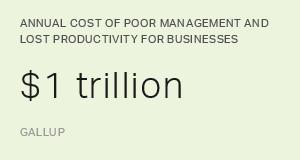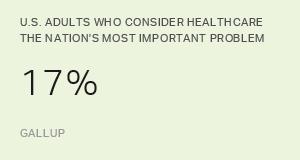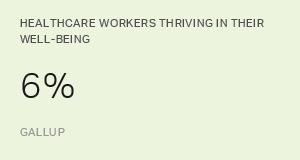Story Highlights
- National nurse turnover is at 17% with no signs of abating
- When leaders visit staff and patients, employee engagement increases
- Develop strategies based on tips in this article to get rounding right
Rounding is perhaps one of the best-known management practices in hospitals today. Nowhere is this more true than with leader rounding.
When hospital leaders, senior managers, administrators, and nurse managers walk the halls, talking with and helping staff and patients, that hospital's employee engagement is bound to increase. For one healthcare client, our work showed a near-linear relationship. The more leaders rounded, the greater the engagement.
And the value of engaged employees in healthcare is worth its weight in gold. Gallup research shows higher nurse engagement is statistically related to lower patient complication and mortality indexes and 41% fewer patient safety incidents. Our research also shows that hospitals with the least engaged nurses pay $1.1 million more annually in malpractice claims than do hospitals with highly engaged nurses.
But rounding doesn't always create an emotional connection. It can easily become a check-the-box task for leaders to speed through amid urgent requests and emergencies. When that happens, the staff knows leaders are just going through the motions, which does nothing to increase engagement.
Clearly, hospital leaders need some way to balance these competing priorities. In our experience working with hospitals, three strategies stand out to help leaders get rounding right.
1. Ask questions that matter to staff.
Asking staff the same questions day after day may be more efficient than effective -- and it sounds robotic. Craft more meaningful questions by thinking about your staff's objectives: what are their needs, their motivations, their struggles, their barriers?
Be direct with your questions, but generative. Rounding shouldn't be a deficit-based inquiry into what went wrong; it should demonstrate your curiosity and elicit positive solutions. So, ask questions like:
- How can this turn out to be better than we could have ever imagined?
- What will success look like if we do this right?
- Can you tell me what this idea will look like in action?
- What can we do today that will help us stay engaged and improve patient outcomes?
Be open to listening to other stories, experiences, trials and tribulations. One could call it reverse-rounding -- being inquisitive rather than interrogative. The purpose here is to stimulate new ideas, stories and images that generate new possibilities for action. You'll have trouble learning if you're always teaching, much like you'll have trouble hearing if you're always talking.
Rounding shouldn't be a deficit-based inquiry into what went wrong; it should demonstrate your curiosity and elicit positive solutions.
And more important than asking the right questions is following up on what you heard -- indeed, you might be surprised which barriers are real problems for your staff. According to Gallup research, only four in 10 employees globally feel they have the material and equipment they need to do their jobs well. A day without hand sanitizer, for instance, can upend a nurse's whole approach to patient care in ways you might not think about unless you ask.
2. Shine the light on what is right.
Rounding is often focused on imparting information about daily tasks and challenges, with little or no space for recognition. It's easy to believe that employees will assume they're doing well unless told differently -- but they don't. Not always. And employees who don't feel recognized don't stay.
Gallup research shows that workers who aren't recognized for their good work are three times more likely to say they will leave in the next year -- and six out of 10 employees do not feel adequately recognized. National nurse turnover is at 17% with no sign of abating. Recognition might be the secret weapon hospitals need to retain nurses as well as a low-cost/high-impact engagement technique.
But handing out a flurry of thank you cards is an ineffective solution. Recognition during rounding must be authentic and meaningful, clearly highlighting the value of the individual's work. Recognition is especially motivating when it taps into what matters most to the individual.
So, tell everybody the nice things their patients say. Encourage peers to recognize each other. Acknowledge all team members to create a greater sense of achievement and connection to the organization's purpose. Recognize the leaders and managers who are rounding effectively -- those who demonstrate a clear impact on efficiency, patient outcomes and engagement.
That helps engagement, but it also allows great employees to be good examples to others -- it's easier to succeed when you know what success looks like.
3. Emphasize the importance of wellbeing.
Burnout is rife in healthcare -- the World Health Organization has started to include it in the International Classification of Diseases (ICD-11) -- and it affects 15.6% of all nurses according to one study, and over half of all U.S. physicians, other studies find. And it hits the disengaged hardest: 41% of all disengaged nurses show signs of burnout.
Rounding represents a great opportunity to help address stress and burnout. Our research shows that employees who do not feel supported by their managers are three times more likely to feel burnout. Conversely, employees who feel their managers involve them in goal setting are 1.9 times less likely to feel burnout, and those who feel their managers work with them to continually clarify work priorities are 1.3 times less likely to feel burnout.
One of the best ways to prevent or reduce burnout is by supporting employee wellbeing. Gallup's research shows that wellbeing is the fulfillment of five elements: career, social, financial, community and physical. You can't solve a patient care tech's wellbeing during rounds, but you can follow up later and encourage them to make use of employee benefits, practice self-care, or make the most of their time off.
That can have a very positive effect on the hospital: employees who are thriving in four or more of these wellbeing elements are four times less likely to feel burnout at work. Unfortunately, only 19% of healthcare workers meet that mark, according to Gallup research.
However, wellbeing initiatives are of little use if nurses, say, are struggling with an unbalanced patient-to-nurse ratio or dealing with the excessive administrative burdens and EHR requirements. So, make sure their voices are heard. Elizabeth Scala, the author of Stop Nurse Burnout, outlines that issue very succinctly:
"Nurses fear that if they speak up, they will not be heard or worse ... will be retaliated against in some way."
Shared governance strategies, such as those put forward by the Magnet Recognition Program, are an effective and evidence-based approach that includes nurses in decision-making and affecting retention, providing a space for voices to be heard.
Use the above 3 strategies to get the most out of every minute.
Rounding gives hospitals a structural advantage over other organizations because rounding requires face-to-face conversations. Most managers don't have enough of them, and Gallup research shows that employees are three times more likely to be engaged when their manager holds regular meetings with them. When managers talk to their employees every day, their teams have nearly double the engagement of those who interact with their managers once a month.
A day without hand sanitizer, for instance, can upend a nurse's whole approach to patient care in ways you might not think about unless you ask.
To optimize the face-to-face advantage, you should make the most of rounding. Make it the time when expectations are clarified, support is provided, and employees are heard -- not punished. Ask yourself three questions when you consider if rounding is effective in your hospital:
- Are you accepting of feedback? Do you demonstrate that you value opinions and that you keep an open mind?
- Are you proactive? Do you reach out to others not only during rounds but also when you know others need assistance?
- Are you responsive? Do you provide feedback on the opinions you solicited during rounding?
Purposeful rounding is an important tactic for nursing managers and administrators to create greater engagement and reduce stress and burnout. And it has a demonstrable effect on patient safety, patient satisfaction, employee morale and engagement.
But rounding is at its best when managers and administrators:
- ask the right questions
- use rounding as a platform for employee recognition
- encourage employees to focus on their own wellbeing
When fully optimized, rounding is a defense against the most critical danger caregivers face: stress and burnout. Leader rounding done well creates an emotional connection that nurtures engagement and wellbeing -- and that's as beneficial for employees as it is for patients.
Discover more Gallup insights so you can create the right emotional connection to nurture engagement and wellbeing:
- Cure modern healthcare starting with its people. Learn more about Gallup's healthcare solutions.
- Watch the on-demand webinar Rx for Effective Performance Development in Healthcare.
- Learn how to build a culture that enhances your brand, improves business results and fulfills your organization's purpose.



